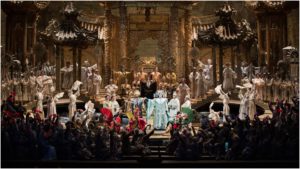
Opera Profile: Puccini’s Final Opera ‘Turandot’
By David SalazarPremiering on April 25, 1926, Puccini’s final opera “Turandot” has always suffered a controversial legacy.
The opera is a fixed repertory staple best-known for one particular piece of music. And yet, it would be hard to claim it the composer’s greatest work overall, as he died before its completion.
Puccini famously struggled with writing its ending and upon his passing Franco Alfano, with help from conductor Arturo Toscanini, went about composing an ending based on the sketches Puccini left behind.
Toscanini famously omitted Alfano’s ending at the world premiere performance, opting to stop the showcase after the last notes that Puccini himself wrote.
Today the opera remains heavily popular, though there have been attempts at writing alternate endings, all of them controversial in their own rights.
Short Plot Summary
Calaf, a foreign prince is in ancient China. He runs into his nomadic father and her slave Liù. When he catches a glimpse of the princess Turandot he falls for her. He decides to meet her challenge of three riddles, even at the risk of his own life, but is stopped by Ping, Pong, Pang, three members of the court who try to dissuade him from the gamble. He decides to go through with it regardless.
Ping, Pong, and Pang lament the violent state of their country. At the royal court and in front of the emperor, Calaf confronts Turandot and her three riddles. He answers the first two correctly and though he is confused a bit by the third, he properly guesses the answer and wins her hand in marriage.
Turandot protests the verdict and her father rejects it. However, Calaf proposes his own riddle – he asks her to find out his name by sunrise. If successful, he will die for her. If not, then she must marry him.
Turandot turns Peking into a war zone as she tries to find out Calaf’s name. She captures Liù and his father, but neither is willing to say his name. Liù commits suicide in the process and Calaf confronts Turandot. He kisses her, suddenly transforming her feelings for him into those of passion and love. Calaf reveals his identity but Turandot won’t reveal his name to her father, calling him “Love.” The two are married and all ends happily.
Famous Musical Numbers
There is perhaps no opera aria more famous than Calaf’s victory cry “Nessun Dorma.”
But the opera has other major musical moments with Calaf’s other aria “Non piangere Liù” and the ensemble it kicks off, perhaps more beautiful and stunning.
Liù has a number of glorious arias herself and Turandot’s famed “In questa reggia” is one of the great soprano powerhouse arias.
The riddle scene is perhaps the most suspenseful scene in all of Puccini and perhaps all of opera at large.
Watch and Listen
Perhaps no tenor and soprano duo is more iconic in this opera than Franco Corelli and Birgit Nilsson. The two had infamous spouts and competitions throughout performances of the opera, challenging one another over who could hold the climactic High C at the end of Turandot’s aria. So here they are in this famed recording of the opera.
Categories
Opera Wiki

